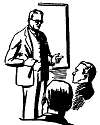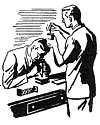 A friend of mine, who teaches general medicine at one
of our large Universities, once told me this story while discussing a
similar point. He is an old hand at teaching medicine. He lectures to
the classes, teaching the boys to be general practitioners. His
system is sound and doesn't differ radically from similar courses
in other Universities, except the last lecture he gives the group. That
lecture is unique. On this occasion, he says, in part:
A friend of mine, who teaches general medicine at one
of our large Universities, once told me this story while discussing a
similar point. He is an old hand at teaching medicine. He lectures to
the classes, teaching the boys to be general practitioners. His
system is sound and doesn't differ radically from similar courses
in other Universities, except the last lecture he gives the group. That
lecture is unique. On this occasion, he says, in part:"Young men, we are together for the last time. We have had a very pleasant time. You have been a good class and I have enjoyed working with you.  "I have given you the best information available - the best case
histories I could find. The textbooks we have used are the most
widely accepted and reliable. But before we part company, I want
to caution you that the science of medicine is developing so rapidly
that in a few vears from now perhaps half of the things I have taught
you won't be so. Unfortunately, I don't know which half that will be."
"I have given you the best information available - the best case
histories I could find. The textbooks we have used are the most
widely accepted and reliable. But before we part company, I want
to caution you that the science of medicine is developing so rapidly
that in a few vears from now perhaps half of the things I have taught
you won't be so. Unfortunately, I don't know which half that will be." |








